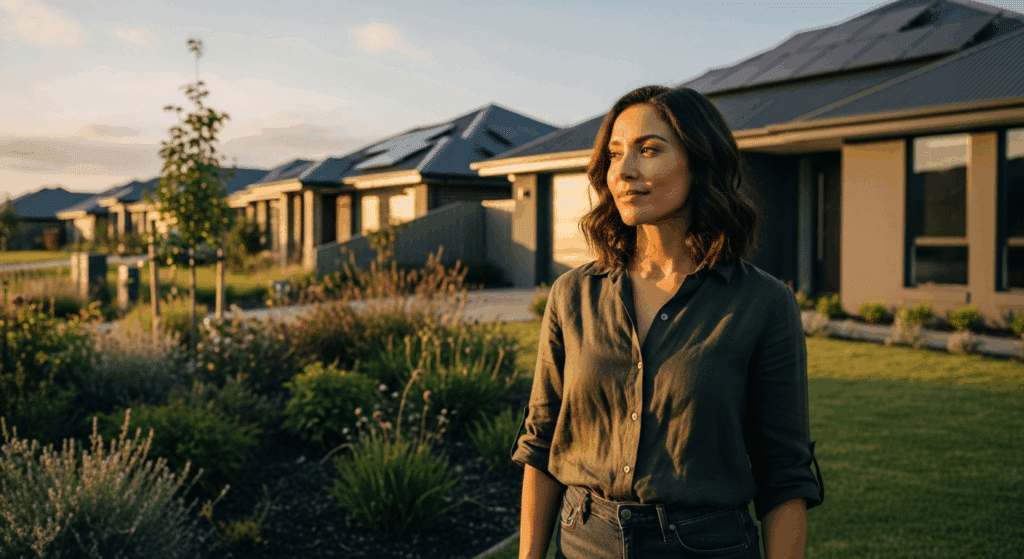Ever dreamed of installing solar panels to slash your energy bills, or replacing your thirsty lawn with a beautiful native garden, only to have a single thought stop you: What will the HOA say? I’ve been there. The fear of getting that dreaded denial letter, or worse, a hefty fine for trying to be more eco-friendly, is a real concern for millions.
It’s a frustration we see time and again, from homeowners being denied solar panels for bizarre aesthetic reasons to being blocked from installing personal EV chargers. With approximately 370,000 HOA communities in the U.S. and 82.4% of new homes sold in 2023 being part of one, this conflict is becoming more common every day.
But here’s the good news: you have more power than you think. This guide is your roadmap to exercising your rights confidently. Here’s what you’re about to learn:
- Which sustainable upgrades are legally protected in Virginia.
- How state law can override your HOA’s specific rules.
- A step-by-step process for submitting your request for the best chance of approval.
- What to do when your HOA unfairly denies your project.
Listen, I’ve navigated the maze of HOA covenants and state statutes, and I’m here to give you the cheat sheet so you can upgrade your home confidently.
HOA Rules vs. State Law: Who Really Has the Final Say?
Your Homeowners Association gets its power from governing documents, usually called covenants, conditions, and restrictions (CC&Rs). These are the rules you agreed to when you bought your home. However, these documents do not operate in a vacuum; they exist within the larger framework of state and federal law. Think of it this way: your HOA’s rulebook is like a local ordinance, but state law is the supreme law of the land within Virginia. If there’s a direct conflict, state law almost always wins.
Across the country, states are recognizing the importance of green initiatives and are actively passing laws to prevent HOAs from blocking them. We’ve seen this trend in states like Indiana, where new laws limit an HOA’s ability to reject solar panels, and that same forward-thinking approach is happening right here in Virginia. The key takeaway for you is simple but powerful: your HOA’s rulebook isn’t the only one that matters; sometimes, it’s not even the most important.
Green Upgrades Your Virginia HOA Has to Approve (With Conditions)
This is where things get really interesting. Virginia law specifically protects your right to make certain eco-friendly improvements. Now, this doesn’t mean you can ignore your HOA entirely. They can still impose reasonable restrictions on your project. The critical part is understanding what’s protected and what a reasonable restriction actually looks like, so you can separate a fair request from an illegal roadblock.
Solar Panels: Your Right to Harness the Sun
Virginia Code § 55.1-1820.1 is your best friend if you want to install solar panels. This law explicitly prevents an HOA from prohibiting installing solar energy collection devices. They can’t just say no. However, they can set reasonable restrictions concerning the size, place, and manner of placement. But here’s the kicker: those restrictions cannot make the system ineffective or increase its cost by more than five percent of the total projected cost. This is a common point of conflict, but this Virginia statute gives you strong legal standing to push back.
Native Plants and Water-Wise Landscaping
Tired of maintaining a water-guzzling grass lawn? Many homeowners face pushback for wanting to create native gardens that support local pollinators and conserve water. A proposed Virginia bill (HB528) would limit an HOA’s ability to prohibit drought-resistant landscaping. It would still allow HOAs to require plan submissions or set reasonable aesthetic rules, but it would stop them from enforcing a complete ban on sustainable, water-wise landscaping. However, it has yet to be passed.
Electric Vehicle (EV) Charging Stations
As electric vehicles become more popular, the need for at-home charging is a major issue, especially in townhomes and condos. Virginia Code § 55.1-1823.1 gives homeowners the right to install an EV charging station for personal use. The law allows the HOA to establish a reasonable application process. You are responsible for the installation cost, the electricity used, and any required insurance, but the HOA cannot unreasonably deny your request to install the charger on your property or in your designated parking space.
Comparison Table: Protected Upgrades at a Glance
| Upgrade Type | Key Virginia Law | What an HOA Can’t Do | What an HOA Can Do (Reasonable Restrictions) |
|---|---|---|---|
| Solar Panels | VA Code § 55.1-1820.1 | Prohibit installation or make it non-functional. | Regulate placement for safety or aesthetics (if it doesn’t impact performance or significantly increase cost). |
| Native Landscaping | Proposed bill: HB528 | Ban the use of xeriscaping or native plants. | Require plan submissions or set reasonable aesthetic rules. |
| EV Charging Station | VA Code § 55.1-1823.1 | Deny your right to install a personal charger. | Require you to pay for installation, electricity, and insurance. |
My Proven 5-Step Process for a Yes from Your HOA

The best way to handle an HOA is to be proactive, professional, and prepared. Following these steps can help prevent unnecessary conflict and get that approval letter in your hands much faster.
- Read Your Governing Documents First: It’s about as exciting as watching paint dry, but you have to start here. Find the section on architectural changes or modifications. This will tell you exactly what forms to use, what information to provide, and the official submission process. Don’t skip this.
- Understand Virginia Law: Come to the table informed. Print or save a copy of the relevant state code (mentioned above) on your phone. As homeowners in other states have found, knowing your rights is your most powerful tool when dealing with an uncooperative board.
- Submit a Professional and Complete Application: Don’t just fire off a quick email. Use their official form. Your application should be neat and thorough. Include detailed plans, material specifications, information about your licensed contractor, and photos or mock-ups of the finished project. Your goal is to make it as easy as possible for them to say yes.
- Reference the Law in Your Application: This is a pro move. In a polite cover letter or in the description section of the application, briefly mention your project and add a sentence like, This request is made in accordance with my rights under Virginia Code § [insert relevant code here]. This simple statement signals that you’ve done your homework and understand your legal protections.
- Follow Up and Attend the Meeting: If you submit your request and don’t hear back within the timeframe specified in your documents, send a polite follow-up email. If your request is on the agenda for an HOA board meeting, make every effort to be there. Being able to answer questions in person can clear up misunderstandings before they snowball into a denial.
What to Do When Rules and Rights Collide
You might still face an improper denial even if you submit a perfect application. Some HOA boards are volunteer-run and may not be current on state laws, while others might be stubborn. When this happens, don’t panic. You still have options.
Common Reasons for Denial (and How to Respond)
Most improper denials fall into a few categories. Suppose they deny your solar panels for being ugly or not fitting the community’s aesthetic. In that case, you can politely point them back to VA Code § 55.1-1820.1, which states that restrictions cannot impair performance or significantly increase cost.
Often, a board is simply unaware of the state law, so your first response should be to provide them with the relevant statute in writing. If they deny your request based on a vague rule, like being out of character with the neighborhood, ask them to provide specific, written clarification on what that means and which section of the governing documents it violates.
Knowing When to Seek Expert Legal Counsel
From my experience, if your HOA remains firm after you’ve presented the facts, it’s no longer a DIY project. This is where an expert legal interpretation becomes critical. An HOA attorney can review your HOA’s governing documents and the denial letter to see if they are overstepping their legal authority under Virginia law. Trying to fight it alone can lead to a lengthy and expensive battle, with litigation often costing homeowners over $10,000. A formal letter from a law firm is usually all it takes to get an HOA to reverse an improper decision.
Your Eco-Friendly Future is in Your Hands
Dealing with an HOA can feel intimidating, but the law is increasingly on your side when it comes to sustainable upgrades in Virginia. You don’t have to give up on your dream of a more energy-efficient and environmentally friendly home just because you live in a planned community. Preparation is everything. By understanding your rights, submitting a thorough and professional application, and knowing when to stand firm, you can overcome most hurdles and make the green improvements you want.
If you’ve successfully installed a green upgrade in your HOA community, share your experience in the comments below! Your story could help another homeowner feel more confident.
Happy upgrading, and here’s to a greener home!
Frequently Asked Questions (FAQ)
Can my HOA in Virginia completely ban me from installing solar panels?
No. Under Virginia Code § 55.1-1820.1, an HOA cannot prohibit solar panel installation. However, it can impose reasonable restrictions on their placement and appearance if those rules don’t significantly impact the panels’ performance or cost.
What happens if I start my project before getting HOA approval?
I strongly advise against this. Starting work without approval often violates the HOA’s bylaws and can result in fines, a stop-work order, and even a requirement to remove the upgrade at your own expense. Always wait for the official approval letter.
Do these rights apply if I am renting my home?
Generally, these rights belong to the property owner. As a renter, you would need to work with your landlord to submit the application to the HOA. The landlord is ultimately responsible for tenant compliance with HOA rules.

